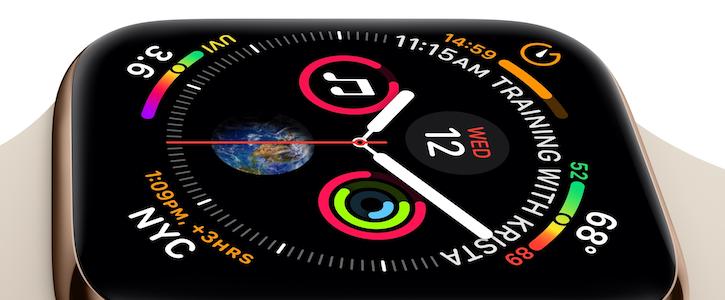J&J Studying How Its App, Apple Watch Can Detect A-Fib Earlier
The Apple Watch ECG reader has drawn criticism, but this study aims to improve patient outcomes and stroke prevention.

Johnson & Johnson and Apple are teaming up to examine how their digital health tools, including the new Apple Watch 4 ECG app, might affect early detection of atrial fibrillation (A-fib). The companies hope to learn how wearable technology and digital health apps can advance stroke prevention.
“We’re excited about the potential of common, wearable technology to aid in the earlier detection and prevention of a frequent cause of stroke,” noted Paul Stoffels, M.D., Johnson & Johnson’s chief scientific officer and an executive committee leader.
>> READ: Why the Apple Watch ECG Reader Might Not Work for All
The study could help shine a light on the true potential of the Apple Watch ECG reader, which brought the discussion on wearables for healthcare to the mainstream when it was introduced last September. Apple’s irregular heart rhythm notifications went on to receive more attention last month when the features went live.
Questions have shrouded the Apple Watch ECG reader, with some physicians arguing it could result in an influx of unnecessary patient visits, damaging the already-strained U.S. healthcare system. In a column for our sister website MedTech Boston last month, Daniel Yazdi, M.D., argued that the Apple Watch ECG reader might not work well for all patients.
But if this study were to validate a heart health program using the Apple Watch ECG reader as a valid path to the early detection of A-fib and better stroke prevention, the implications for patient outcomes could silent critics.
Janssen Pharmaceuticals, a division of Johnson & Johnson, is slated to run the multiyear study of U.S. senior citizens. The organization plans to test how a Johnson & Johnson app, Apple’s irregular heart rhythm notifications and the Apple Watch ECG reader can work in conjunction to result in earlier A-fib diagnoses.
The organizations intend to measure patient outcomes of a heart health engagement regimen tied to the Apple Watch. They also plan to monitor the effects of a medication adherence app from Johnson & Johnson.
“This collaboration brings together Johnson & Johnson’s depth of expertise and long heritage in treating cardiovascular disease with Apple’s experience in utilizing cutting-edge technologies to improve the lives of consumers,” Paul Burton, M.D., Ph.D., vice president of medical affairs for internal medicine at Janssen said in a statement. “Ultimately, we hope to improve the treatment of cardiovascular disease and identify ways to prevent it.”
The research findings could affect any number of people who have or may develop A-fib. Right now, 33 million people have the condition, which causes 130,000 deaths and 750,000 hospital visits in the U.S. annually.
Despite healthcare insiders’ concerns, Apple executive Jeff Williams said the Apple Watch ECG reader has already helped patients.
“Through Apple Watch, people have been able to learn more about their heart health, including discovering they have A-fib,” Williams, the chief operating officer, said.
The study is slated to begin sometime in 2019.
Get the best insights in healthcare analytics directly to your inbox.
Related
A Smartwatch Might Have Saved My Dad’s Life
Apple Unveils Health-Heavy Smartwatch with EKG Reader